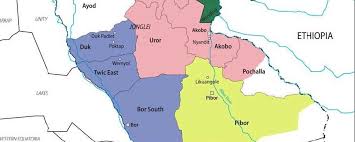Youth from South Sudan’s Boma State were not involved in attacks, which left dozens of people dead and over 2,000 cows stolen from neighboring Bieh State, a local official said Wednesday.
On Tuesday, at least 38 people were reported killed and 86 others wounded in two separate attacks by cattle raiders in Bieh State. Bieh State authorities claimed the attackers were armed Murle pastoralists.
Speaking to Radio Tamazuj on Wednesday, the Boma State information minister, Margaret Golla Aleyo denied involvement of the Murle community in the attacks.
“There was a report from Bieh that Murle youth raided their areas. I want to tell those in Bieh that the report is not true. There are many rebel groups and bandits in the bush. So the attackers could not be from Murle. If they were Boma youth, we would not hide because we want peace,” said Golla.
She dismissed claims that the Murle youth crossed into Lou Nuer areas.
Golla, however, said her government would investigate the incidents.
“As a government, we don’t have knowledge of the attackers. So we will investigate to find out if the attackers were armed civilians or rebels,” she stressed.
The minister urged authorities in the greater Jonglei region to avoid counter-accusations against neighboring communities over cattle raids without sufficient evidence, saying this could undermine peace and reconciliatory efforts among communities in the region.
Meanwhile, the executive director of Jonglei Institute for Peace, Democracy and Development, Juuk Othana Mading condemned the attacks in Bieh State, urging the national government to intervene by apprehending the raiders and retrieving all the stolen animals.
He expressed fears that the humanitarian conditions in the affected areas could worsen since the locals depended on cows for livelihood.
Cattle raids are common among pastoral communities living in the region. Livestock herding is the main source of income in many parts of South Sudan.




